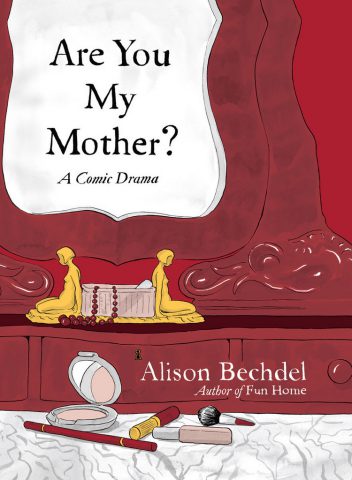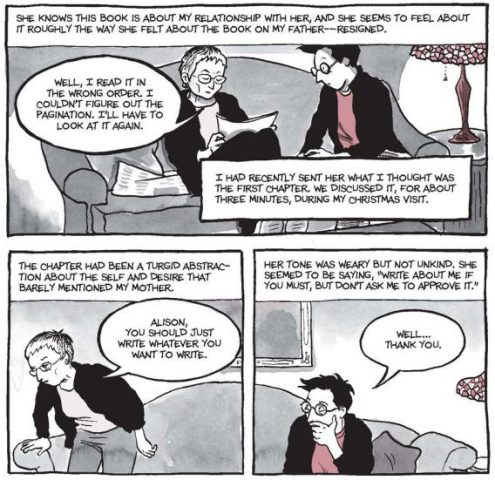Are You My Mother?: A Comic Drama
by Alison Bechdel
(Houghton Mifflin Harcourt)
Bechdel’s first graphic memoir, Fun Home, focused with dark humor and candid introspection on the twin topics of her own coming-out and her father’s closeted life. Now it’s Mom’s turn to be the focus, but this second memoir-in-art-and-words is something quite different. For starters, Bechdel’s Dad was dead when she plumbed her early years, but the cartoonist’s mother is still quite alive—and her potential reaction to her daughter’s revelations is woven through the book. So, too, are Bechdel’s years of analysis—her therapists are characters—as are her dreams, along with a textual immersion in the words of a pair of shrinks, Alice Miller (The Drama of the Gifted Child) and Donald Winnicott, whose writing focused on children and the concept of the “good enough mother.” Throw in a bunch of lengthy quotes from Virginia Woolf, and the book’s surface look is intimidating. But there’s magic in Bechdel’s fluid artwork, panel after panel that demands and deserves both a careful reading and a profound gaze, all the better to embrace this book’s affirmative complexity.
Ill Will
by J.M. Redmann
(Bold Strokes Books)
Maladies are the motif of Redmann’s seventh Mickey Knight series, set again in the ongoing malaise of post-Katrina New Orleans. On the sleuthing side, Knight is drawn into the deadly scam of “natural” immune-boosting and disease-destroying cure-alls. On the personal side, her still-fragile relationship with lover (and medical doctor) Cordelia—unfaithful earlier in the ongoing saga of their lives together—is further fraught when Cordeila is diagnosed with cancer. As is the norm with the series, Redmann’s hard-boiled PI tackles the twists and turns of her case and its attendant violence with dogged determination and a sometimes foolish and defiant denial of danger, which makes for a fast-paced story. Also the norm: the intimate details of Mickey and Cordelia’s domestic travails, as two busy women try to find time for the basics of a relationship—shopping for groceries, cooking for each other, holding hands while dining out, fumbling back to a fulfilling sexual intimacy. It’s this blend of professional and personal lives that renders Redmann’s series so engrossingly well rounded.
The Song of Achilles
by Madeline Miller
(Ecco Press)
There’s a double-barreled delight to this romantic, and even sometimes erotic, retelling of the Iliad. Readers familiar with the world of Achilles, Odysseus and Apollo, and the rest of Homer’s panoply of gods and mortals, will be enthralled by Miller’s debut novel, a page-turning rendition of a classic tale. Better yet, readers who snoozed through their Ancient Greek seminars will be immersed in a glorious blend of commercial fiction and impassioned history—a fabulously fun way to engage one of literature’s masterworks. What sets Miller’s captivating reworking of Homer apart from other versions—there have been dozens—is that it’s narrated (even after his death) by awkward one-time prince Patroclus, selected by golden boy Achilles to be his companion and, as this telling makes clear, his lover. This ravishing novel, with its depictions of battlefield savagery and its recounting of a sensuous connection, honors the tradition of lesbian author Mary Renault, whose trilogy based on the life of Alexander the Great similarly made clear that queers are a classic motif.
Footnotes: Two more queer-interest books to anticipate
There’s a long history of LGBT characters anchoring straight-authored fiction, from Annie Proulx’s short story “Brokeback Mountain” to Andre Aciman’s novel Call Me By Your Name. Two recent, riveting novels (in addition to Madeline Miller’s) honor the tradition with flair. Audrey Schulman’s Three Weeks in December (Europa Editions) tells the parallel tales of two outcasts, American ethnobotonist Max, who in 2000 finds that her Asperger’s (a mild form of autism) connects her with gorillas in Rwanda; and of a young American engineer, Jeremy, who in 1899—after an indiscretion with another man—leaves small-town Maine to oversee a perilous railroad construction project across British East Africa, where he is drawn to the lithe body of his native companion, Otombe. “Mesmerized, Jeremy took a half step forward, perhaps to trace this delicate pulse with one finger, perhaps to pull this man’s whole body against his chest.” Even more “out” is Herta Muller’s The Hunger Angel (Metropolitan Books), the German author’s first English-translated novel, narrated by closeted Leo, a teenager when he’s imprisoned after the Second World War in a Soviet labor camp, where he knows that to survive he must suppress memories of the “strange, filthy, shameless and beautiful” sex he sought before his detention. “Discreetly, after work, I look at the young Russians on duty taking a shower. I’m so discreet I forgot why I’m looking. They would kill me if I remembered.”
Richard Labonte has been reading, editing, selling, and writing about queer literature since the mid-’70s. He can be reached in care of this publication, or at BookMarks@qsyndicate.com.



What Do You Think?